Like many Christians I have struggled with the issue of beloved family members who do not also believe. I want to pray with trust and faith, but was always blocked because although I know without a doubt that God can do anything and that nothing is beyond Him. I also know that He doesn’t do everything I want. And I had no assurance that God planned on saving my family.
So one day, in a desperate attempt to ascertain if it MIGHT be God’s Will to save my family, I looked up as many Bible verses as possible on the subject, because I know that God’s Word does not lie, it does not have errors and that God has said His Word will not return void. The following verses and their explanations of why they have been chosen are below.
The basic principles are: What does God say to Christians in this situation? Are there any promises we can hold on to? What is God’s heart for the families of His chosen? Do our actions really have any effect on whether our families also come to Christ or not?
Here is what I found, and I made lovely Bible verse images you can save and meditate on, remind yourself about, pray over, beseech God with…
And I pray that you will find the peace that this document gave me. I no longer am stressing about if my family is to be saved. I still pray for them daily, but without the fear and anxiety. Now I am also asking God just to give me patience while I wait for the fulfilment of His promises in His timing. Whether that is tomorrow, decades from now, or even on their deathbed and I might not get to know about it. But I do trust that “His salvation extends to the children’s children of those who are faithful…”, that “The children of Your servants will continue, And their descendants will be established before You” and “the descendants of the righteous will be delivered”.
- Direct Biblical Promises for Family and Future Generations
These scriptures offer direct promises or encouragement that God’s saving grace can extend to one’s family, children, and future generations:

* Acts 2:39 (NASB): “For the promise is for you and your children and for all who are far off, as many as the Lord our God will call to Himself.”
Context: Peter, on the day of Pentecost, assures the crowd that the promise of the Holy Spirit and salvation in Christ extends not only to them but also to their children and future generations. This verse encourages believers that God’s covenant blessings are not limited to one generation but can reach our loved ones as God calls them.

* Acts 16:31 (NASB): “They said, ‘Believe in the Lord Jesus, and you will be saved, you and your household.'”
Context: Paul and Silas speak these words to the Philippian jailer. The jailer’s entire household indeed came to faith that night (Acts 16:32–34). While this is a specific historical instance (see more under narrative examples), it is often taken as a hopeful principle: a believer’s faith can open a door of salvation to their whole family. It reassures us that God is able to save “you and your household” – implying our families are not beyond His reach.

* Proverbs 11:21 (NASB): “Assuredly, the evil person will not go unpunished, But the descendants of the righteous will be delivered.”
Note: As a proverb, this is a general principle rather than an absolute guarantee. It reflects God’s typical pattern of blessing on the families of the righteous. It encourages parents that living faithfully can have a positive spiritual impact on their children – “the descendants of the righteous will be delivered” (often understood as delivered from sin or trouble).

* Proverbs 14:26 (NASB): “In the fear of the LORD there is strong confidence, and his children will have refuge.”
Explanation: A parent who fears and trusts God can have confidence that God will be a refuge for their children. This implies that our reverence for God creates a spiritual “safe place” or covering for our family. It’s a promise of protection and potential salvation – our faith can provide a refuge our children may flee to in times of need.

* Proverbs 20:7 (NASB): “A righteous man who walks in his integrity— How blessed are his sons after him.”
Walking faithfully before God often results in blessings that flow down to one’s children. This verse assures that the legacy of righteousness benefits our offspring. For a believing parent concerned about wayward adult children, it’s a reminder that the blessing of your integrity can still influence them and, in time, lead them back to God.

* Isaiah 49:25 (NASB): “Surely, thus says the LORD, ‘…I will contend with the one who contends with you, And I will save your sons.'”
Context: God is speaking to Zion (His people) about future restoration. “I will save your sons” is a promise that God Himself will rescue the children of His people from captivity. Many Christian parents claim this verse in prayer, believing that God will fight against the spiritual enemies holding their children and save their sons (children). It portrays God as a divine warrior on behalf of your family’s salvation.

* Isaiah 54:13 (NASB): “All your sons will be taught of the LORD; And the well-being of your sons will be great.”
Context: This promise to God’s people declares that their children will personally know (“be taught of”) the Lord. It gives hope that even if a child strays, God Himself can ultimately teach and draw them. Jesus alludes to this in John 6:45 when He speaks of those who come to Him as those “taught by God.” It reassures us that God can reach the hearts of our sons and daughters in His timing.

* Isaiah 59:21 (NASB): “‘As for Me, this is My covenant with them,’ says the LORD: ‘My Spirit which is upon you, and My words which I have put in your mouth shall not depart… from the mouth of your offspring, nor… your offspring’s offspring,’ says the LORD, ‘from now and forever.'”
Here God promises that His Spirit and His words will remain with future generations. In context, this speaks of God’s covenant with Israel, but by extension it offers hope that when God’s Spirit and Word are present in a family, coming generations will not depart from that influence. It’s a powerful assurance that God’s truth planted in your family will carry on to your children and grandchildren “from now and forever.”

* Jeremiah 31:16–17 (NASB): “Thus says the LORD, ‘Restrain your voice from weeping and your eyes from tears; for your work will be rewarded,’ declares the LORD, ‘And they will return from the land of the enemy. There is hope for your future,’ declares the LORD, ‘And your children will return to their own territory.'”
Context: God speaks to Rachel (symbolically, Israel mourning her lost children) to not lose hope. He promises that the children “in the land of the enemy” will return. For a Christian parent, this passage is deeply comforting – God sees your tears and says do not weep without hope. Your prayers and “work” in raising them “will be rewarded.” “Your children will return” from the enemy’s domain of unbelief. There is hope for your future! – God can restore them to the “territory” of faith they once knew.

* Jeremiah 32:38–40 (NASB): “They shall be My people, and I will be their God. And I will give them one heart and one way, that they may fear Me always, for their own good and for the good of their children after them. I will make an everlasting covenant with them that I will not turn away from them, to do them good; and I will put the fear of Me in their hearts so that they will not turn away from Me.”
Explanation: God’s new covenant promise includes blessings “for the good of their children after them.” He vows to put a reverent fear of Him in the hearts of His people and their children, so that they will remain with Him. This is a strong encouragement that under the New Covenant in Christ, God actively works in our families to draw hearts to Him and keep them from ultimately turning away. He is able to unify a family’s heart in “one way” – the way of faith in Him.

* Genesis 17:7 (NASB): “I will establish My covenant between Me and you and your descendants after you throughout their generations for an everlasting covenant, to be God to you and to your descendants after you.”
Context: God made this promise to Abraham, marking the start of covenantal inclusion of believers’ children (signified by circumcision). Christians see in this the heart of God to be God not only to believers but also to their children. It undergirds the hope that God’s covenant love and promises embrace our offspring. In effect, “I will be your God and your children’s God.” This verse is foundational for why many believers have confidence dedicating or baptizing children – trusting God’s promise to work in their hearts in due time.

* Deuteronomy 7:9 (NASB): “Know therefore that the LORD your God, He is God, the faithful God, who keeps His covenant and His lovingkindness to a thousandth generation with those who love Him and keep His commandments.”
God’s faithfulness spans “a thousand generations” of those who love Him. If you love and serve the Lord, this verse assures you that your posterity is in view of His covenant love. “A thousand generations” is hyperbole for unending faithfulness – meaning God will not forget your children, even long after you’re gone. This encourages us to persevere in love and obedience, trusting God to faithfully pursue our family line with His grace.

* Deuteronomy 30:6 (NASB): “Moreover, the LORD your God will circumcise your heart and the heart of your descendants, to love the LORD your God with all your heart and with all your soul, so that you may live.”
Here is a direct promise that God can spiritually transform not just you but your descendants. To “circumcise the heart” means to remove hardness and make one responsive to God. He promises to do this for your children’s hearts as well, enabling them “to love the LORD” wholeheartedly. This is a wonderful assurance that the salvation work God began in you can continue into your children’s lives – God Himself can perform the needed heart-change in them.

* Psalm 103:17–18 (NASB): “But the lovingkindness of the LORD is from everlasting to everlasting on those who fear Him, and His righteousness to children’s children, to those who keep His covenant and remember His precepts to do them.”
(NLT says “Salvation” not righteousness, so I have chosen that version for the image)
God’s covenant love and righteousness extend to our grandchildren (“children’s children”). If we fear God and follow His ways, we can expect His favour to rest on our offspring after us. This verse offers hope that our reverence for God creates a spiritual legacy; God’s “everlasting” mercy will actively pursue and bless our children and grandchildren with opportunities for righteousness and salvation.

* Psalm 112:1–2 (NASB): “Praise the LORD! How blessed is the man who fears the LORD, who greatly delights in His commandments. His descendants will be mighty on earth; the generation of the upright will be blessed.”
This psalm echoes that a godly person’s “descendants” are impacted by that godliness. “Mighty on earth” and “blessed” can certainly imply spiritual strength and favour. For a parent grieving a child’s lost faith, this is a reminder that the story isn’t over: the blessing on the “generation of the upright” can still make your children mighty in faith. God’s hand of blessing is on your family line because of your faith.

* Psalm 102:28 (NASB): “The children of Your servants will continue, and their descendants will be established before You.”
This lesser-known verse explicitly mentions the children of God’s servants. It promises they will “continue” (dwell securely) and be established before God. It suggests permanence – that the faith and relationship with God that you have will not be uprooted in your lineage. Your service to God lays a foundation upon which your children can stand firmly “before” Him. Even if they waver now, God is able to establish them in His presence because they are children of His servant (you).

* Proverbs 22:6 (NASB): “Train up a child in the way he should go, even when he is old he will not depart from it.”
Note: This verse is often quoted by parents concerned for wayward adult children. As a proverb, it states a general truth: a child raised with godly training will eventually return to that foundation. It implies that the truths and prayers invested in your children will remain with them. If your husband and children “appeared to believe” when younger (baptized, devout, etc.), this training in the way of the Lord is like a seed dormant in their hearts. “When he is old he will not depart” gives hope that as they mature (or in a future season of life), what was sown in them can spring back to life. Many testify of sons or daughters who return to faith later on, as this proverb implies.
In summary, these promises reinforce that your loved ones are not outside the reach of God’s covenant mercy. His Word gives you grounds to hope that the faith you hold can cascade down to your household. Continue to “fear the LORD” and “delight in His commands” (Ps 112) – your steadfast faith is a conduit through which God’s grace can flow to your spouse and children.
Narrative Examples of Household Salvation in Scripture
The Bible contains stories of entire families coming to faith, which, while descriptive (not explicit promises), demonstrate God’s heart to save households. These examples inspire hope that what God did for them, He is able to do for your family:


* Noah’s Family – Genesis 7:1, 7 & Hebrews 11:7: God saved Noah and his whole household from the Flood. “Then the LORD said to Noah, ‘Enter the ark, you and all your household…'” because Noah alone was righteous (Gen 7:1). Noah’s wife, sons, and daughters-in-law were preserved due to Noah’s faith. Hebrews 11:7 notes that Noah “prepared an ark for the salvation of his household.” This narrative shows a believing head of a family acting in faith can result in the physical and spiritual salvation of his family. Application: You, like Noah, are walking faithfully with God in a corrupt generation. Take heart – God noticed Noah’s prayers and made a way for his family; He can do the same for yours.

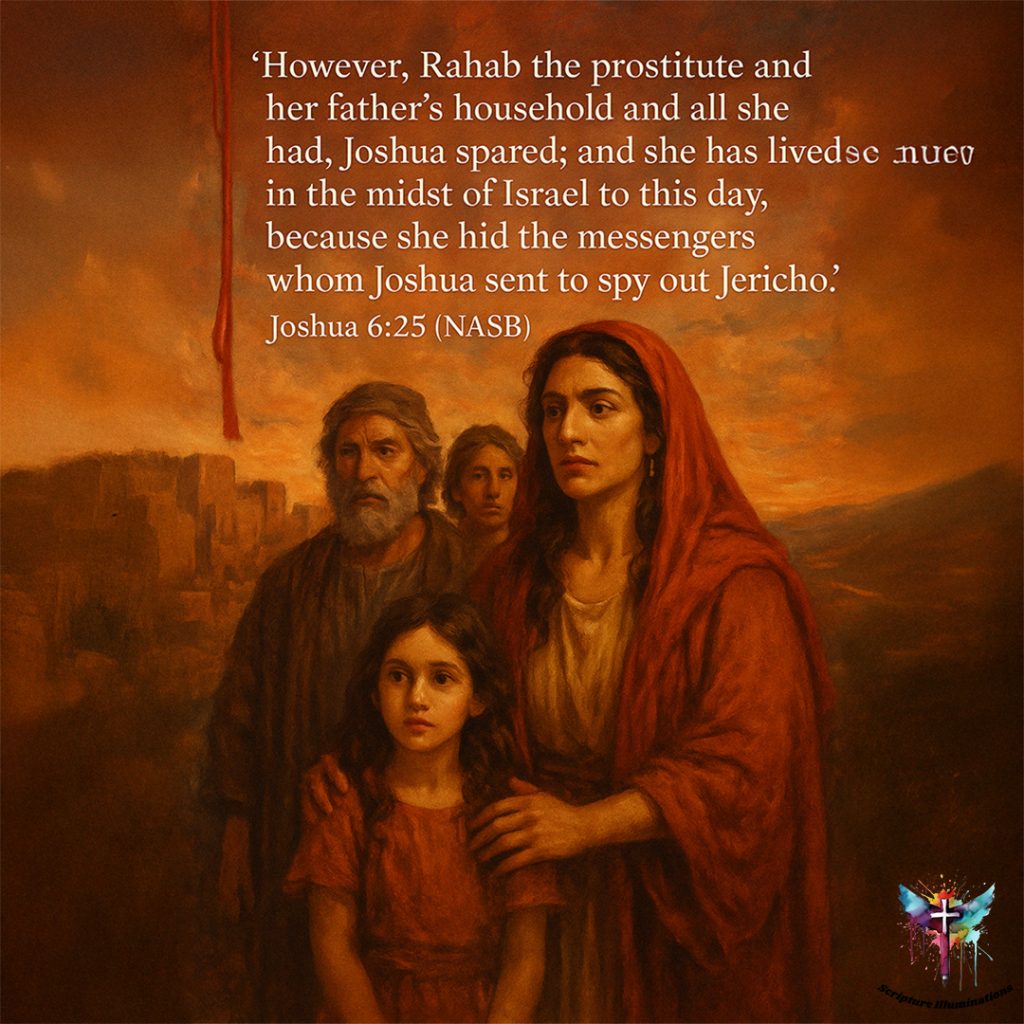
* Rahab’s Family – Joshua 2:13; 6:25: Rahab, a prostitute in Jericho, believed in Israel’s God and hid the Hebrew spies. She pleaded, “Spare my father and my mother and my brothers and my sisters, with all who belong to them, and deliver our lives from death” (Josh 2:13). The spies agreed, and when Jericho fell, “Joshua spared Rahab the harlot… and she has lived in the midst of Israel to this day, for she hid the messengers” (Josh 6:25). Not only Rahab, but her entire extended family were saved from destruction because of her faith and action. Narrative relevance: Rahab’s family probably didn’t share her faith initially (they may even have thought her crazy), but her faith covered them. In the end, they all came out of Jericho and dwelt among God’s people. This encourages you that one person’s faith in a family can lead to the rescue of many relatives. Keep praying and acting in faith for your loved ones; God can honour your faith by saving them, even if they are currently “in Jericho” (in the world).

* The Philippian Jailer – Acts 16:27–34: We saw Paul’s promise to him (“you and your household” will be saved). The narrative continues: “…and he [the jailer] rejoiced greatly, having believed in God with his whole household.” (Acts 16:34). In one night, through miraculous events and the gospel message, an entire pagan family – the jailer and all in his house – came to faith and were baptized. Narrative relevance: This is a powerful example that God can work suddenly and sovereignly in a family, even in dire circumstances. The jailer was on the brink of suicide, his household was asleep in spiritual darkness – but God intervened dramatically. In your context, things may seem dark, but God can orchestrate circumstances (perhaps not an earthquake, but other wake-up calls) that bring your whole family to the joy this jailer experienced. “Believed in God with his whole household” is a phrase you can pray to see fulfilled in your own home.

* Cornelius’ Household – Acts 10:1–48: Cornelius, a Roman centurion, was a devout man seeking God. God sent Peter to share the gospel. While Peter preached, the Holy Spirit fell on all who were listening in Cornelius’ house (Acts 10:44). Cornelius had gathered his relatives and close friends (Acts 10:24), so this was a household plus extended circle. They all were baptized in the name of Jesus (Acts 10:48). Peter later said, “[Cornelius] will speak words to you by which you will be saved, you and all your household” (Acts 11:14).
Narrative relevance: Cornelius was the spiritual leader who brought his family and friends to hear God’s word. God responded by pouring out the Spirit on everyone present. This shows God’s readiness to save whole groups/families who gather to seek Him. Perhaps you can identify with Cornelius – you fear God and pray constantly for your family. Peter’s words “you and all your household” came true for Cornelius; similarly, God can send the right “Peter” (witness) at the right time to bring saving truth to your family, resulting in a beautiful group conversion.

* Lydia’s Household – Acts 16:13–15: Lydia, a businesswoman in Philippi, believed in Christ after hearing Paul. “And when she and her household had been baptized…” (Acts 16:15). Presumably, Lydia led her whole household (perhaps family members and servants) to respond to the gospel message.
Relevance: Lydia’s story is brief but telling – the faith of one influential family member can influence the rest. Once she opened her heart to Christ, her entire household followed in baptism, indicating their faith as well. If your husband once professed faith and your children were baptized when young, Lydia’s case is an example of a household that entered the covenant together. Though some of your family members later drifted, remember that they once identified with Christ like Lydia’s household. That history with God is not erased; God can rekindle it. Lydia’s household reminds us that God often moves through family networks – He saved families in the New Testament, not just isolated individuals.
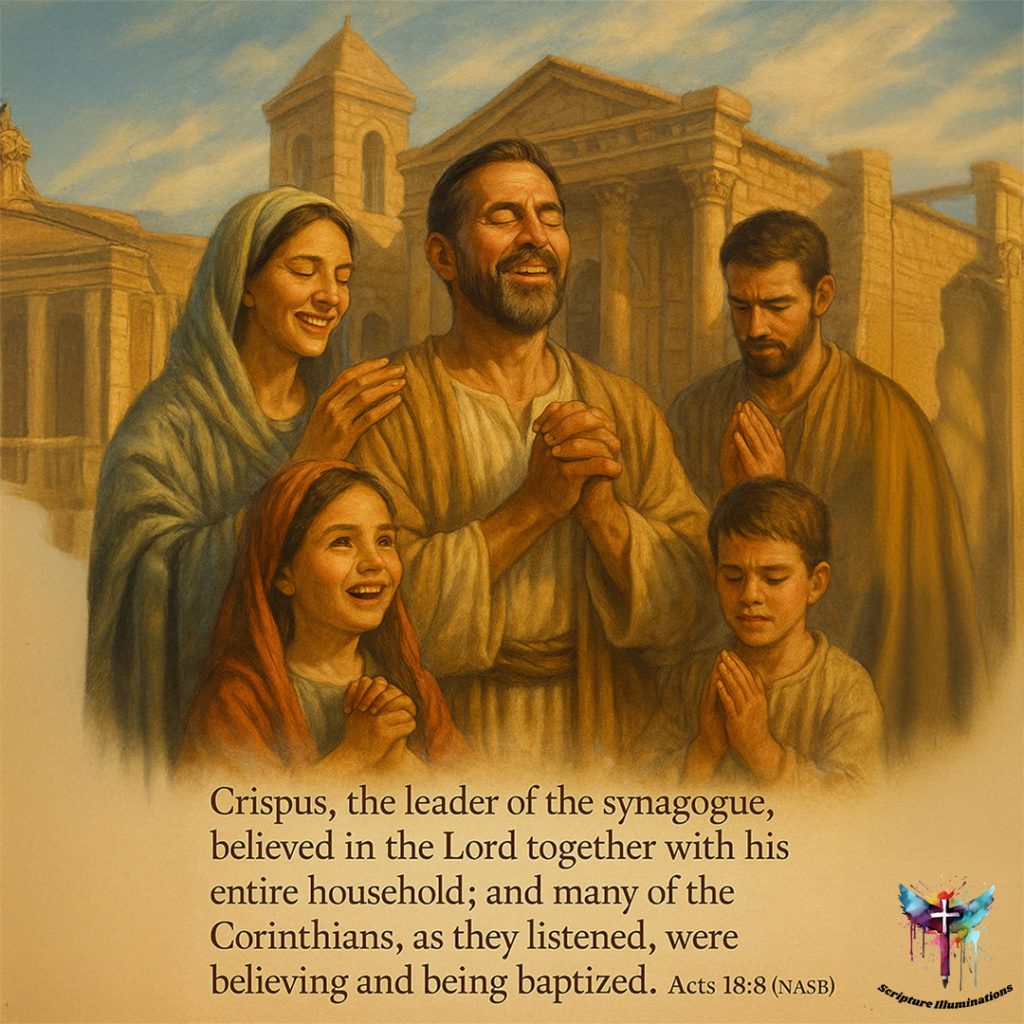
* Crispus, the Synagogue Leader – Acts 18:8: “Crispus, the leader of the synagogue, believed in the Lord with all his household.” Here was a Jewish leader in Corinth who accepted Paul’s message. Not only Crispus but everyone in his household became believers.
Relevance: Again, the gospel penetrated an entire family unit. The phrase “with all his household” is repeated multiple times in Acts – indicating a pattern. God loves to save families together. It’s a reminder to claim not just individual family members, but to pray for the salvation of your family as a whole. Just as Crispus’s family together became part of the young church in Corinth, your family can together become part of God’s kingdom story.
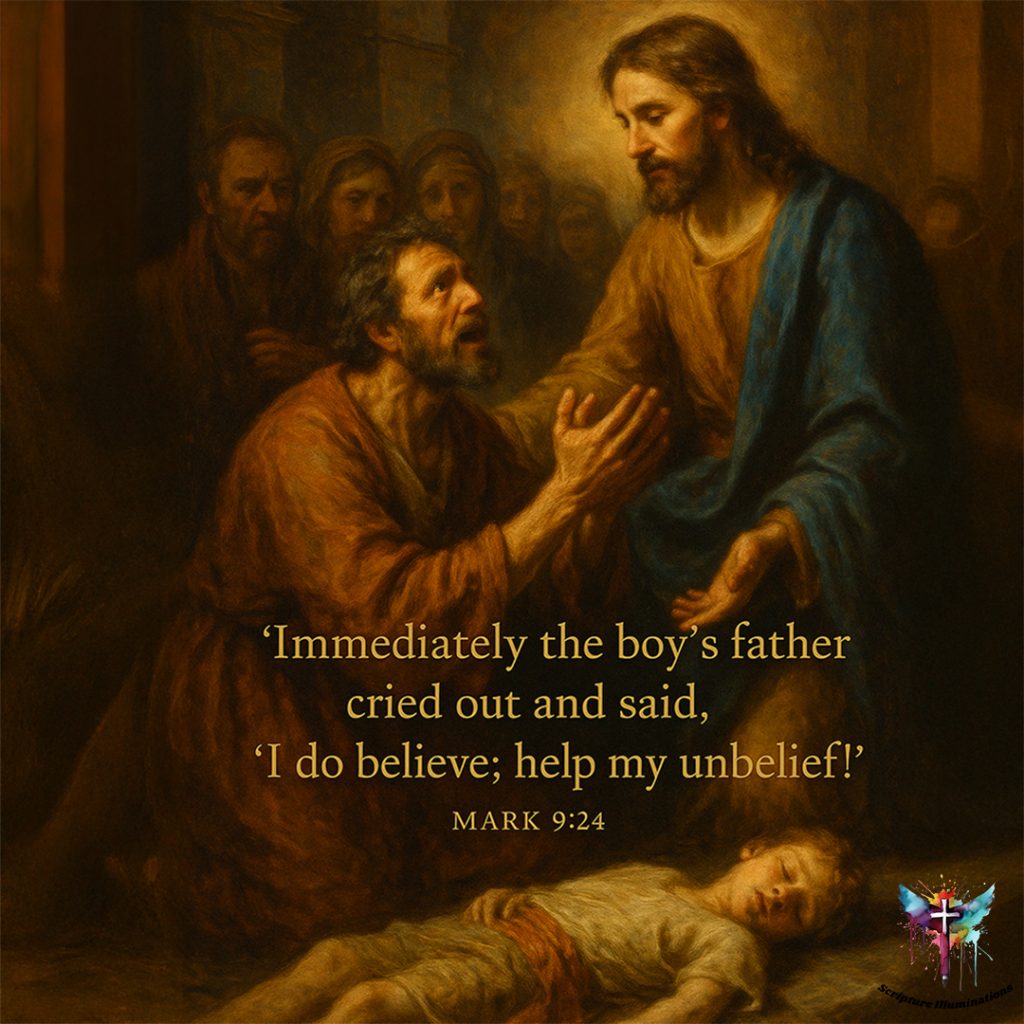
* The Family of the Demon-Possessed Boy – Mark 9:17–27: While not a multi-person conversion story, this narrative shows a parent’s faith bringing deliverance to a child. A father brought his son, afflicted by an evil spirit and unable to help himself, to Jesus. The father cried, “I do believe; help my unbelief” (Mark 9:24). Jesus responded to the father’s mixture of faith and doubt by casting out the demon and setting the boy free.
Relevance: Many parents can relate to this father – believing yet struggling – on behalf of a suffering (or unbelieving) child. Jesus honoured the interceding parent’s faith. The boy was restored to wholeness, which surely led him in time to personal faith. This story isn’t about salvation per se, but it illustrates that Christ responds to the pleas of parents for their children. In your prayers for your children’s salvation, even if you feel like crying “help my unbelief”, know that Jesus is full of compassion for that cry. He rebuked the evil tormenting the boy; He can likewise rebuke the spiritual lies or bondages holding your children back and bring them to spiritual sanity.

* The Prodigal Son – Luke 15:11–24: Jesus’ parable of a wayward son who left his father’s house and squandered everything is a poignant picture of backslidden children. Eventually, the prodigal “came to his senses” (Luke 15:17) and decided to return home, expecting wrath but instead receiving a father’s embrace and restoration.
Relevance: This parable is meant to reveal God’s heart for sinners, but on a personal level it gives immense hope to parents. The prodigal did return! Importantly, the father never stopped looking down the road for his son. When he saw him coming, he “ran to him.” This is how our Heavenly Father feels about your family who have “run off” in spiritual rebellion – His heart yearns for their return. Your stance, like the prodigal’s father, is to watch and pray with expectant hope. Jesus included this story to assure us that wandering sons can come home. No matter how far gone a family member seems, the moment they “come to themselves” and turn Godward, they will find a loving Father ready to receive and restore them fully.
Note: These narrative examples are descriptive, not explicit guarantees that every family will experience the exact same outcome. However, they reveal God’s character and typical ways: He honours the faith of one family member to bless many (Noah, Rahab, Cornelius, etc.), and He often works in households. They encourage us to keep praying and not lose heart, because God is able to save entire families. As you read these, let them fuel your prayers: “Lord, You saved that whole household; I believe You can do it in mine as well.”

Finally, consider the influence of a godly heritage as seen in Scripture. Timothy, for example, was shaped by the sincere faith of his mother Eunice and grandmother Lois (2 Timothy 1:5). Though Timothy was saved as a young adult through Paul, the groundwork was laid by the faith of his family. In your case, you are a believer; like Lois and Eunice, your faithful witness is not in vain. The generational seeds of faith planted by you can bear fruit in God’s timing.
Indirect Support: Covenantal Blessings and Spiritual Heritage
Beyond direct promises and stories, Scripture provides indirect encouragement through the concepts of covenant theology and the spiritual heritage of believers’ families. These passages require a bit of explanation, but they strongly imply hope for the salvation of believers’ loved ones:
The Principle of Covenantal Inclusion: In the Bible, when God makes covenants with His people, He often explicitly includes their children. We saw this in Genesis 17:7 (God to Abraham: “to you and to your descendants after you”). Similarly, Peter on Pentecost declared, “the promise is for you and your children” (Acts 2:39, noted above). This gives rise to the idea in many Christian traditions that the children of believers are “covenant children” set apart to God. For example, Paul writes in 1 Corinthians 7:14 that even if only one spouse is a believer, “your children… are holy” (meaning “set apart”). This does not mean automatic salvation, but it indicates a special status of the children of a Christian home under God’s grace.
Application: Your children are “holy” in God’s sight – set apart in a way that children of unbelievers are not. God has His mark on them, and we can trust He will pursue them for salvation.

* 1 Corinthians 7:14 (NASB): “For the unbelieving husband is sanctified through his wife, and the unbelieving wife is sanctified through her believing husband; for otherwise your children are unclean, but now they are holy.”
Explanation: “Sanctified” here doesn’t mean the unbelieving spouse or child is saved automatically, but rather consecrated or set apart under the influence of the gospel. In God’s eyes, a home with even one believer is not “unclean” – it’s a sphere of His grace. The faith of the wife/mother “sanctifies” her family, creating an environment where salvation is within easy reach. Your spouse, though currently not a believer, is in a sense covered by your faith as his spouse. This verse encourages you that God regards your family as having a special claim on His grace. Your persistent prayers and Christlike behaviour are not meaningless – they have a sanctifying effect that keeps the door to salvation open wide in your home.

* 1 Corinthians 7:16 (NASB): “For how do you know, O wife, whether you will save your husband? Or how do you know, O husband, whether you will save your wife?”
Explanation: Just two verses later, Paul gently reminds believing spouses to remain with their unbelieving partners because there is a very real possibility that the unbeliever will be saved through the influence of the believer. “How do you know… whether you will save your husband?” is an encouragement to not give up. God can use your witness over time to lead your husband to Christ. This aligns perfectly with 1 Peter 3:1–2:

* 1 Peter 3:1–2 (NASB): “In the same way, you wives, be submissive to your own husbands so that even if any of them are disobedient to the word, they may be won without a word by the behaviour of their wives, as they observe your chaste and respectful behaviour.”
Application: This is practical counsel mixed with hope. Peter acknowledges some husbands “do not believe the word” (i.e. are unsaved or not obeying the gospel), but he holds out hope that a wife’s godly conduct can “win” them over “without a word.” In other words, it may not be your arguments or Bible lectures that bring your husband back to faith, but rather the quiet sermon of your life – your respect, purity, love, and steadfast faith. Seeing you live the truth out genuinely, without nagging, can reawaken his conscience. This verse encourages you that your daily faithfulness to Christ preaches to your spouse’s heart, even if he isn’t outwardly responding yet. God’s strategy for an unbelieving spouse is patient love and holiness on the believer’s part, which He can use to “win” the other’s soul. Keep living out Jesus before him – your life may be the Bible he will read.

* Deuteronomy 4:37 (NASB): “Because He loved your fathers, therefore He chose their descendants after them…”
Here Moses tells Israel that God’s love for Abraham, Isaac, and Jacob resulted in Him choosing their children (the Israelites). This reflects a pattern: God often shows favour to someone because of the faith of their ancestors. It is not presumptuous to ask God to remember His love for you and extend it to your kids “because He loved their parent, therefore choose his/her descendants after him/her.”

* Psalm 22:30–31 (NASB): “Posterity will serve Him; It will be told of the Lord to the coming generation. They will come and will declare His righteousness to a people who will be born, that He has performed it.”
This prophetic psalm, ultimately about Jesus’ victory (Ps 22 begins with the crucifixion imagery and ends in triumph), foresees future generations serving the Lord. “Posterity” and “coming generation” include your children and grandchildren. “They will come and declare His righteousness.” This can be taken as a quiet assurance: God’s plan is that the next generation will hear and declare the gospel. You have sown those seeds in your children; this psalm suggests that by God’s grace they will come and declare His righteousness in due time.

* Proverbs 11:21b (NASB): “…the descendants of the righteous will be delivered.”
This was mentioned earlier as a direct proverb, but it bears repeating in this context: if you are righteous in Christ, God says your descendants “will be delivered.” Many Christian parents have clung to this half-verse, praying it back to God: “Lord, You promised – deliver my son/daughter from unbelief/temptation/evil!” It’s an indirect promise wrapped in wisdom literature, but not to be ignored. God put it in His Word to encourage us that living for Him has generational impact. You can pray this verse by name for your family, e.g., “Lord, deliver [Child’s Name], my descendant, for You have said the children of the righteous will be delivered.”

Example of David: King David walked with God, and long after David died, God continued to show kindness to David’s family “for the sake of David.” For instance, 1 Kings 15:4 says, “But for David’s sake the LORD his God gave [David’s descendant] a lamp in Jerusalem by raising up a son….” and 2 Kings 8:19, “Yet the LORD was not willing to destroy Judah, for the sake of David His servant, since He promised him to give a lamp to him and his sons forever.”
Application: David’s case is specific (a promise regarding the throne of Israel), but it reveals that God often remembers the faith of a parent or grandparent and blesses a wayward child years later because of that prior relationship. It’s like a spiritual inheritance. You can appeal to God on this basis: “Lord, for the sake of the faith of their grandparents, and my faith in You, please bring my children back.” Scripture shows He honours such prayers.

* The Power of Intercessory Prayer: While not a verse about family per se, James 5:16 reminds us “The effective prayer of a righteous person can accomplish much.” Your prayers are extremely powerful because you are righteous in Christ. The Bible encourages persistent prayer – Jesus spoke of a widow who kept beseeching a judge until she got justice, to teach us “always to pray and not lose heart” (Luke 18:1–8). When praying for family salvation, it can take time, but don’t lose heart. Your prayers, like water dripping on a stone, are wearing down resistance in ways only God sees right now.

* God’s Desire and Character: It’s helpful to remember verses like 1 Timothy 2:4, which says God our Savior “desires all men to be saved and to come to the knowledge of the truth.” And 2 Peter 3:9, “The Lord… is patient toward you, not wishing for any to perish but for all to come to repentance.” These reflect God’s loving heart – He does not enjoy anyone remaining unsaved. Certainly, that includes your family. If God’s own desire is for their salvation, you can confidently align your prayers with His will. You’re not begging a reluctant God; you’re partnering with a God who loves your family more than even you do and is patiently working to draw them.
Taken together, these indirect supports build a strong case for hope: God’s covenant mercy runs in family lines, your faith sanctifies your household environment, and He hears your prayers on their behalf. While each person must make their own choice to trust Christ, the deck is stacked in their favour because of God’s promises and your faithful witness.
Predestination and Election: Trusting God’s Sovereign Plan
If you believe in predestination and election, you will view them as part of God’s sovereign plan for salvation. Far from discouraging prayer, the doctrine of election can greatly encourage you about your family’s future salvation. It assures us that God is ultimately in control of who comes to Christ, and that He has the power to overcome even the hardest heart. Here are key verses and how they apply:
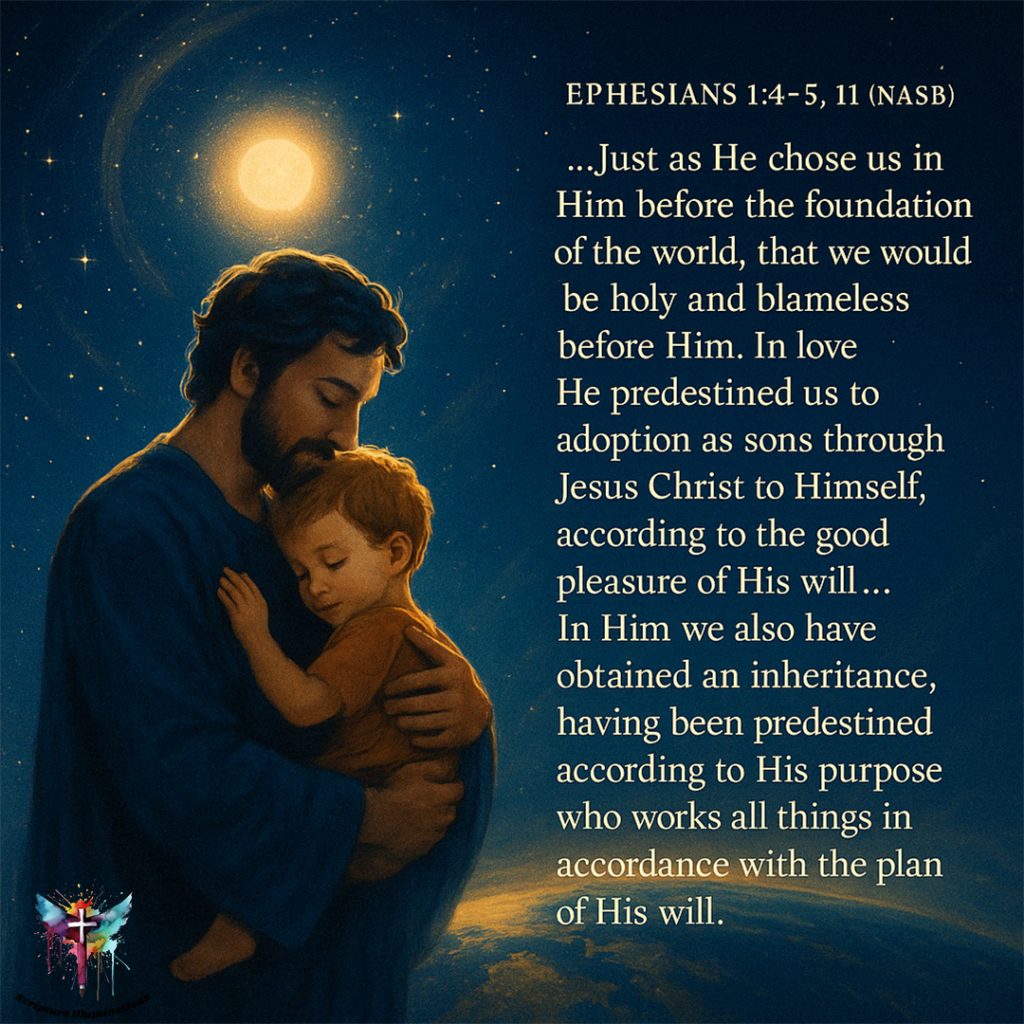
* Ephesians 1:4–5, 11 (NASB): “…just as He chose us in Him before the foundation of the world, that we would be holy and blameless before Him. In love He predestined us to adoption as sons through Jesus Christ to Himself, according to the kind intention of His will… In [Christ] also we have obtained an inheritance, having been predestined according to His purpose who works all things after the counsel of His will.”
Explanation: These verses teach that God, in love, chose (elected) His people before creation. Their salvation and adoption into His family was predestined (pre-planned) as part of His purpose. If you believe this, then you know that salvation isn’t ultimately a random chance or merely human decision – it’s God’s work from beginning to end. How does this give hope for your family? If your spouse and children are among God’s elect, then God will not fail to retrieve His own. He “works all things” – even seasons of doubt or rebellion – toward the fulfillment of that plan. You can pray, “Lord, if You chose my loved ones before the foundation of the world, I know You will bring them to Yourself in due time – because Your will cannot be thwarted.”


* Romans 8:28–30 (NASB): “And we know that God causes all things to work together for good to those who love God, to those who are called according to His purpose. For those whom He foreknew, He also predestined to become conformed to the image of His Son…; and these whom He predestined, He also called; and these whom He called, He also justified; and these whom He justified, He also glorified.”
Encouragement: This is often called the “golden chain” of salvation. Notice the verbs – foreknew, predestined, called, justified, glorified – all are past tense because from God’s view His plan is as good as done. Even if your family are wandering now, God “causes all things to work together for good” – He can use this wandering to eventually humble them and bring them back stronger. No link in this golden chain will break: what God starts in someone, He finishes (Philippians 1:6 affirms this: “He who began a good work in you will perfect it until the day of Christ Jesus.”). So when you worry about their current unbelief, remember God’s perspective – He sees the finished product. Their story isn’t over, and if they truly belong to Him, He is actively working even now to complete their journey to glory.

* John 6:37 (NASB): Jesus said, “All that the Father gives Me will come to Me, and the one who comes to Me I will certainly not cast out.”
Explanation: Here Jesus speaks of those the Father “gives” Him – a reference to the elect. Notice the absolute language: “will come to Me.” This means if your family are among those the Father has given to Jesus, they will inevitably come to Jesus – it might be in a dramatic reconversion moment, or a quiet turning of heart, but it will happen. And Jesus promises He will never cast them out when they come. This verse can comfort you that ultimately it’s not up to your persuasiveness to get them to come to Christ; the Father Himself is drawing them. And Jesus stands ready with open arms, not to reject (“cast out”) but to warmly receive them when they approach. Even if right now they resist, Jesus assures that the Father’s gift to the Son (the people He chose) will reach its destination.

* John 6:44 (NASB): “No one can come to Me unless the Father who sent Me draws him; and I will raise him up on the last day.”
Explanation: This underscores that coming to faith is a supernatural work of God (“draws him”). Perhaps you look at your family and think, “They seem incapable of believing.” That may be true humanly speaking – “no one can come” by their own ability. But the Father is actively drawing people to Jesus, and He can do that for your loved ones. You can pray in line with this: “Father, no one can come unless You draw them – please draw my family to Jesus again.” And Jesus’ promise is if the Father draws someone, Jesus will “raise him up on the last day,” meaning complete their salvation and give eternal life. Trust that God’s draw is stronger than their drift. His pull can reel them back in, even from far away.

* John 10:27–29 (NASB): “My sheep hear My voice, and I know them, and they follow Me; and I give eternal life to them, and they will never perish; and no one will snatch them out of My hand. My Father, who has given them to Me, is greater than all; and no one is able to snatch them out of the Father’s hand.”
Encouragement: If your family ever genuinely belonged to Jesus (even if now they question it), then they are His sheep. Jesus says His sheep never perish and no one (no doubt, no sin, no devil) can snatch them from His or the Father’s hand. They may wander like lost sheep for a time, but the Good Shepherd goes after lost sheep until He finds them (Luke 15:4-7). Jesus twice emphasizes the unbreakable grip of God on His people. You can find rest in this: ultimately, their salvation is not in their own weak grip on God, but in God’s strong grip on them. If they are His, He will not let them go. He will pursue them into whatever valley or wilderness they stray, and carry them home on His shoulders rejoicing (as the parable of the lost sheep says).

* Acts 13:48 (NASB): “…and as many as had been appointed to eternal life believed.”
In this account, the gospel is preached in Pisidian Antioch, and Luke notes that only those whom God had appointed (chosen) believed. The timing of their belief coincided with God’s appointment.
Application: The salvation of your family members is not left to chance; it’s in God’s hands. If God has appointed them to eternal life, at the appointed time they will believe. Perhaps that time was in the past (and they will return to it), or perhaps their prior belief was genuine and will resurface as true perseverance. Either way, this verse gives confidence that belief follows God’s appointment. So you ask God: “Have You appointed my loved ones to eternal life? If so, let them believe fully again.” Since we don’t know for certain who is elect until they persevere, we pray with hope, because verses like this show God is actively overseeing who comes to faith.

* Romans 9:15–16 (NASB): “For He says to Moses, ‘I will have mercy on whom I have mercy, and I will have compassion on whom I have compassion.’ So then it does not depend on the man who wills or the man who runs, but on God who has mercy.”
Explanation: Paul is explaining that salvation depends on God’s mercy, not human effort or desire alone. This is sobering (because we can’t force God’s hand) but also deeply comforting – your family’s salvation doesn’t ultimately depend on their will or running, but on God’s merciful will. And we know God is merciful and compassionate. If your spouse or child currently “wills” not to follow God, that can change in an instant when God’s mercy touches their heart. Their salvation rests in the merciful character of God. His mercy can overrule their resistance. This frees you from trying to argue or push them into the kingdom (our “running”); rather, you cry out for God’s mercy to overtake them. God’s sovereignty means He can reach anyone – no matter how high the walls they’ve built.

* 2 Thessalonians 2:13 (NASB): “…God has chosen you from the beginning for salvation through sanctification by the Spirit and faith in the truth.”
This reiterates that from the very start, salvation is initiated by God’s choice. If your loved ones were raised in the faith, one might see evidence of God’s choosing in that privilege alone. This verse also shows the means by which God’s election comes to fruition: by the Spirit (who can work in their hearts even now) and by faith in the truth. It reminds you to pray for the Spirit’s continued sanctifying work in them – even while distant, the Spirit can prod their conscience – and to pray they will yet put faith in the truth they know. God’s choice “from the beginning” gives us hope to the end.
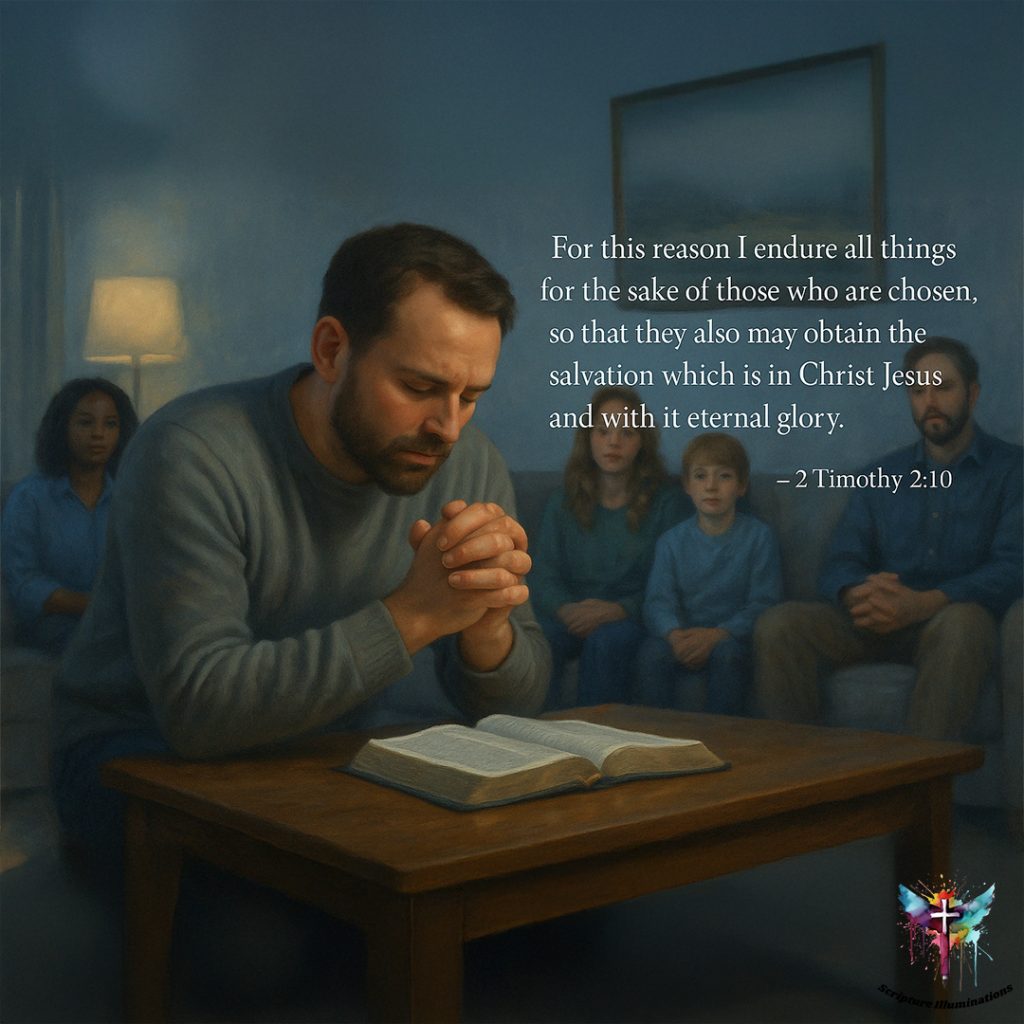
* 2 Timothy 2:10 (NASB): “For this reason I endure all things for the sake of those who are chosen, so that they also may obtain the salvation which is in Christ Jesus…* “
Explanation: Paul endured hardships because he knew God had chosen people out there who had not yet “obtained” salvation, and his efforts would be the means to bring them in. Likewise, your endurance in prayer and love is “for the sake of the elect” in your family. You don’t know definitively that they are elect, but you hope and act as if they are, trusting God to use your endurance to help save them. This perspective can fuel perseverance – “Lord, I’ll keep enduring in faith and love, because maybe my son/daughter is among Your elect and my role is to be part of their journey back to You.”
One Caution and Comfort: We must acknowledge that not all who appear to believe are truly born again (for example, 1 John 2:19 notes some who departed the faith never truly “of us”). Often, those who have genuinely encountered Jesus but drift away experience the most misery in their sin – like Lot who was a believer living in Sodom, their souls are vexed and they cannot fully enjoy sin nor peace until they return. Proverbs 22:6 (training a child) and the Prodigal Son story both suggest that early faith has a way of calling someone back eventually. You can be like Monica, the mother of Augustine, who prayed her pagan son into the kingdom after years of wild living. Augustine became one of the greatest church fathers – a testimony that a praying parent and the sovereign grace of God can rescue even a long-time unbeliever.
In summary, predestination and election tell us that God is the author of salvation. Your family members’ salvation is not a roll of the dice; it’s secured by God’s eternal plan. Therefore, you can rest in God’s power and timing. Keep praying and pointing them gently to Christ, but leave the heavy lifting to the Holy Spirit. He is more than able to irresistibly draw those who belong to Him.
In Conclusion:
Combining all these threads – direct promises, biblical examples, covenant principles, and God’s sovereignty – you have strong reasons for hope. Your spouse and children are not beyond God’s reach. In fact, by virtue of their exposure to the gospel and your continued faith, they are in a prime position to be touched again by God’s grace.
- Pray the Scriptures over them. For instance, you might pray: “Lord, You promised that the descendants of the righteous will be delivered. I stand on that promise and ask You to deliver my children from unbelief and deception. You desire none to perish, and You have begun a good work in them – please complete it. You chose our family to know You; be the God of my children and grandchildren as You were the God of their grandparents. Jesus, You said none can snatch Your sheep – rescue these wandering sheep of Yours and bring them home.”
- Be encouraged that God hears a praying spouse and parent. Your persistent intercession, like Monica’s for Augustine or like the father’s in the prodigal story (implicitly waiting and hoping), is powerful. It may take time, but hold on to hope. As Jeremiah 31 said: “There is hope for your future… your children will return.”
- Finally, remember God’s own Father-heart. He understands your anguish for your family. Jesus wept over Jerusalem, yearning for His people to come to Him. If we, as flawed humans, long so deeply for our loved ones’ salvation, how much more does God long for and actively work toward the salvation of those prodigals! The story isn’t finished yet. With God, the ending of the story can be glorious, no matter how chapters in the middle look.
- Stand on His Word, continue in love, and look with expectation for God to move.
May these verses and truths fortify your faith as you wait for God’s saving grace to break through. There is abundant reason to say with the psalmist, “I would have despaired unless I had believed that I would see the goodness of the LORD in the land of the living.” So “Wait for the LORD; be strong and let your heart take courage” (Psalm 27:13–14). You will yet see His goodness in the land of the living – in your very own household. Amen.


